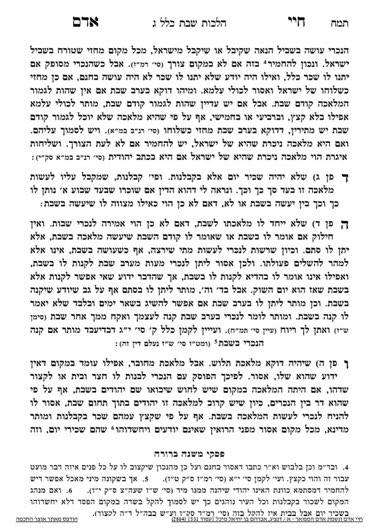We are continuing in siman 6, where the Chayei Adam discusses the fifth criterion for it to be permitted to make an arrangement with a non-Jew before Shabbos regarding melacha on Shabbos. This criterion is that the item which the non-Jew will be working on must be talush, detached from the ground. If the item is mechubar, attached to the ground, whether agricultural or construction, it is assur.
The Chayei Adam raises the point that when it comes to agriculture, if the arrangement is of kablanus, it will be assur (as we have learned), but if it is of arisus, it will be muttar. Arisus is sharecropping, meaning that the worker takes a percentage of the produce of the field for himself. Kablanus means that the worker receives a set fee for his work, as we have discussed until now. The issue with kablanus in this case is that it is quite easy to confuse a sechir yom with a kablan, and think that the arrangement with the non-Jew is actually one of sechir yom rather than kablanus. It is also much easier to see the connection between the non-Jew and the Jewish employer, and therefore associate the melacha with the Jew. Arisus is muttar because the aris is clearly focused on himself and his own benefit, so people who witness the aris working will immediately conclude that the worker is working for himself. Therefore, it is muttar for an aris to work on a field on Shabbos, even though it is mechubar.
Practically, we do not live in an agricultural society, and certainly not in a sharecropping society, so the concept of arisus is generally not relevant. We grapple with questions of a non-Jew doing work as a kablan or sechir yom.
At the end of the siman, the Chayei Adam grapples with techum Shabbos vis a vis the non-Jew performing work on something mechubar (see shiur S0077). He writes that if one has a non-Jew performing work outside of the techum of the Jewish owner, and there is no other city within the techum of the location of the work, it is muttar to have the non-Jew work as a kablan, because the concern of chashad is irrelevant.
It is clear from the presentation of the Chayei Adam that the concern of chashad exists even if other Jews are unsure who is the specific owner of the field. As long as they know the field belongs to a Jew, it is assur to perform the work within the techum of other Jews.
On a practical level, this creates an interesting contemporary concern. We know that there could be non-frum Jews anywhere, so can we still apply the heter of the work being outside of the techum? Could we argue that the non-frum Jews do not even realize that the work they may be seeing is assur? The assumption of the poskim is that we still have a concern. The fact that a Jew could see it and draw wrong conclusions from it is a concern regardless of their level of religiosity, so one would have to be concerned for a non-frum Jew driving past their field, even if it is outside of the techum of any cities.
The Chayei Adam ends the siman with the halacha that the concern of chashad overrides even a public need or a mitzvah, including building a shul. However, the Piskei Mishnah Berurah points out that in a case in which the non-Jewish workers threaten that if they are not allowed to work on Shabbos, they will quit the entire job and the shul will not be built, it will be muttar to allow them to work on Shabbos, provided that the arrangement is one of kablanus. It is proper to find some vehicle through which to publicize that the arrangement is one of kablanus.
The Biur Halacha brings an argument that in his time, goyim were makpid not to perform work on their sabbaths, so for Jews to arrange for work to be done on our Shabbos may be a chillul Hashem. Therefore, if there is no need, we will not rely on any leniencies, unless the building will never be built, chas vshalom.
Summary
If one instructs a non-Jew before Shabbos, there are times when it will be muttar, depending on eight conditions.
The fifth condition is that the item not be attached to the ground, due to a concern of maris ayin.
However, if the maris ayin is not relevant, such as in a place where Jews have no access on Shabbos, it is not a problem. On the other hand, one must be concerned for the possibility of non-frum Jews driving past.
An arrangement of arisus is always muttar.
Work being done for a mitzvah, such as building a shul, may be muttar if the mitzvah will not otherwise be completed.
One should discuss such questions with their rav.



